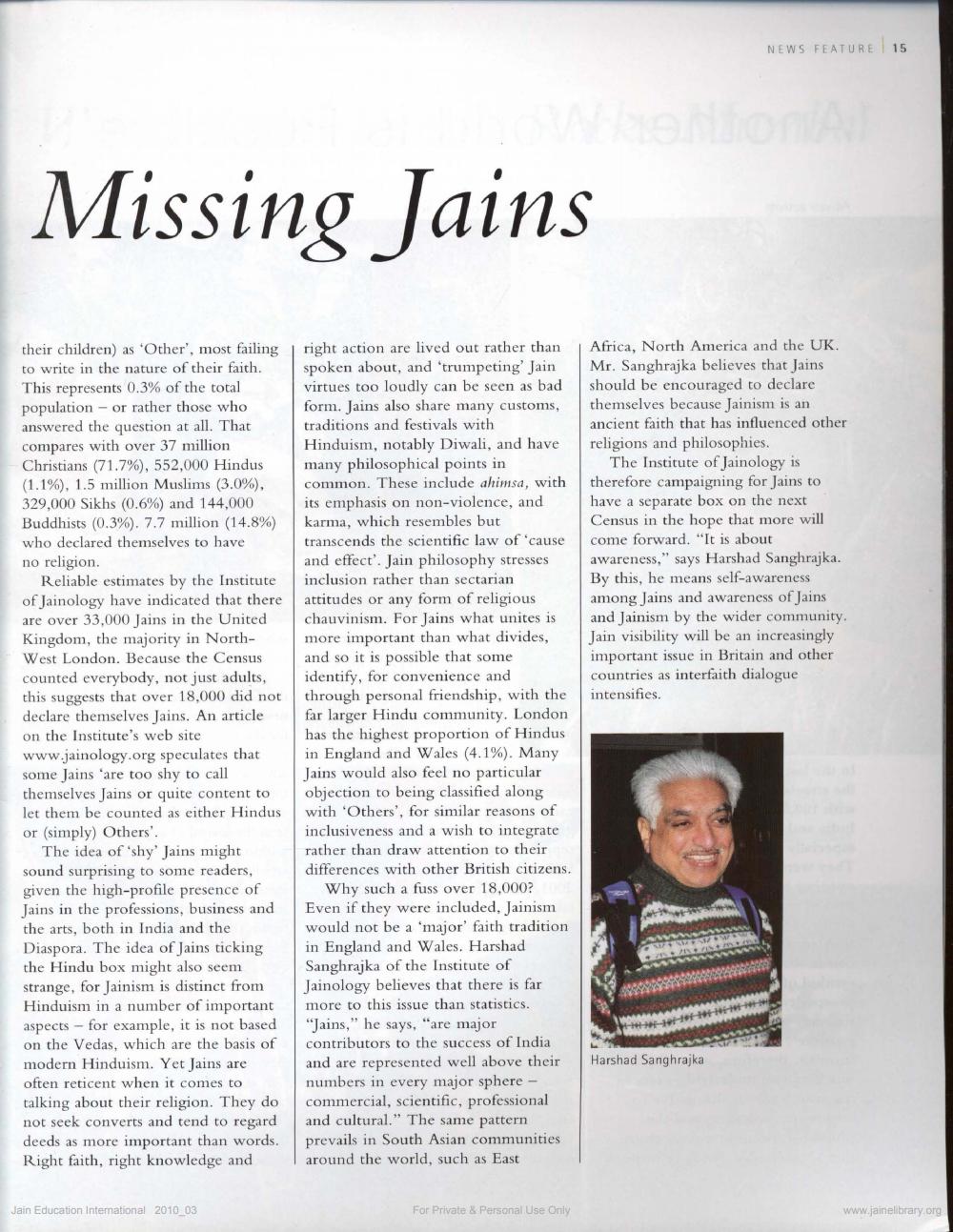________________
Missing Jains
Whe
their children) as 'Other', most failing | right action are lived out rather than
to write in the nature of their faith. This represents 0.3% of the total population or rather those who answered the question at all. That compares with over 37 million Christians (71.7%), 552,000 Hindus (1.1%), 1.5 million Muslims (3.0%), 329,000 Sikhs (0.6%) and 144,000 Buddhists (0.3%). 7.7 million (14.8%) who declared themselves to have no religion.
Reliable estimates by the Institute of Jainology have indicated that there are over 33,000 Jains in the United Kingdom, the majority in NorthWest London. Because the Census counted everybody, not just adults, this suggests that over 18,000 did not declare themselves Jains. An article on the Institute's web site www.jainology.org speculates that some Jains 'are too shy to call themselves Jains or quite content to let them be counted as either Hindus or (simply) Others'.
spoken about, and 'trumpeting' Jain virtues too loudly can be seen as bad form. Jains also share many customs, traditions and festivals with Hinduism, notably Diwali, and have many philosophical points in common. These include ahimsa, with its emphasis on non-violence, and karma, which resembles but transcends the scientific law of 'cause and effect'. Jain philosophy stresses inclusion rather than sectarian attitudes or any form of religious chauvinism. For Jains what unites is more important than what divides, and so it is possible that some identify, for convenience and through personal friendship, with the far larger Hindu community. London has the highest proportion of Hindus in England and Wales (4.1%). Many Jains would also feel no particular objection to being classified along with 'Others', for similar reasons of inclusiveness and a wish to integrate rather than draw attention to their differences with other British citizens.
The idea of 'shy' Jains might sound surprising to some readers, given the high-profile presence of Jains in the professions, business and the arts, both in India and the Diaspora. The idea of Jains ticking the Hindu box might also seem strange, for Jainism is distinct from Hinduism in a number of important aspects for example, it is not based on the Vedas, which are the basis of modern Hinduism. Yet Jains are often reticent when it comes to talking about their religion. They do not seek converts and tend to regard deeds as more important than words.. Right faith, right knowledge and
Jain Education International 2010_03
Why such a fuss over 18,000? Even if they were included, Jainism would not be a 'major' faith tradition in England and Wales. Harshad Sanghrajka of the Institute of Jainology believes that there is far more to this issue than statistics. "Jains," he says, "are major contributors to the success of India
and are represented well above their Harshad Sanghrajka numbers in every major sphere - commercial, scientific, professional and cultural." The same pattern prevails in South Asian communities around the world, such as East
For Private & Personal Use Only
NEWS FEATURE 15
Africa, North America and the UK. Mr. Sanghrajka believes that Jains should be encouraged to declare themselves because Jainism is an ancient faith that has influenced other religions and philosophies.
The Institute of Jainology is therefore campaigning for Jains to have a separate box on the next Census in the hope that more will come forward. "It is about awareness," says Harshad Sanghrajka. By this, he means self-awareness among Jains and awareness of Jains and Jainism by the wider community. Jain visibility will be an increasingly important issue in Britain and other countries as interfaith dialogue intensifies.
www.jainelibrary.org




